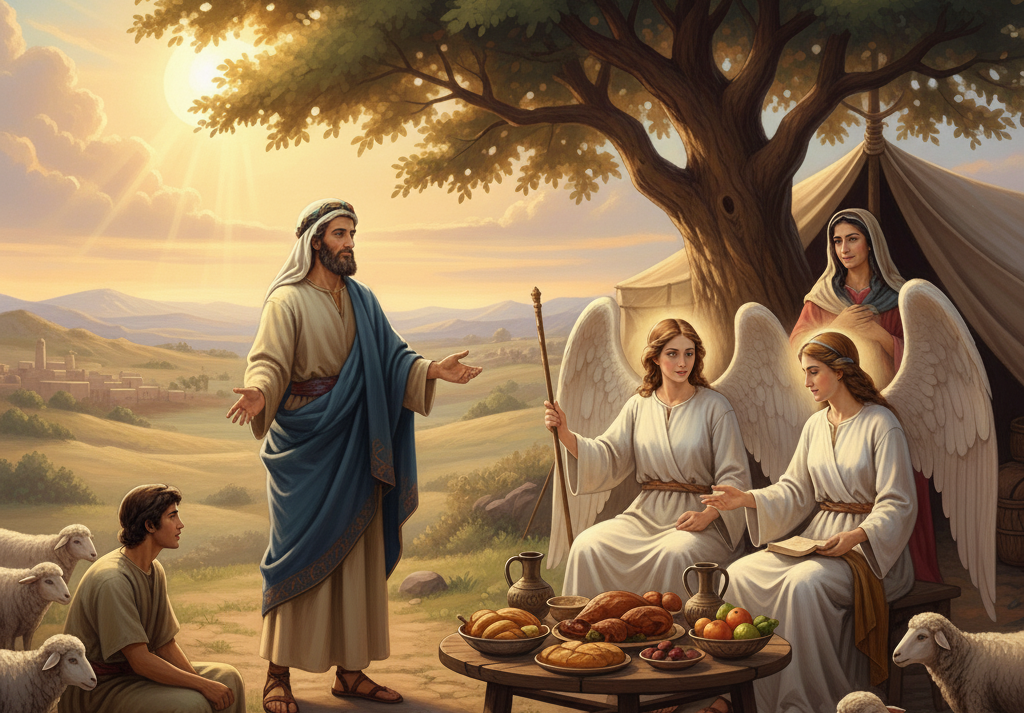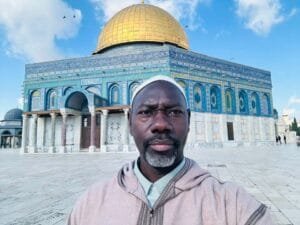Hospitality, Mercy, and the Angels of Abraham: Reflections on Parashat VaYera

By Rebecca Abrahamson
In this week’s Torah portion, VaYera (“And He Appeared”), book of Genesis 18:1 – 22:24, Prophet Abraham (pbuh) is recovering from his circumcision when three travelers appear before his tent.

Despite being in pain, Abraham rushes to welcome them, offering food and rest beneath the shade of the tree. The Torah tells us that these guests were angels in human form, Gabriel, Michael, and Raphael, each sent by God with a specific mission.
Three Angels, Three Missions
Rabbinic tradition teaches that each angel performs only one task.
Michael was sent to announce the birth of Isaac, Raphael to heal Abraham and later to save Lot, and Gabriel to bring God’s judgment upon Sodom. This is why three angels came to Abraham, but only two continued to Sodom, as Michael had
already completed his mission. (Talmud Bava Metzia 86b; Rashi on Genesis 19:1).
Muslim commentators, including Ibn ʿAbbās, al-Qurṭubī, and Ibn Kathīr, preserve a similar tradition: that the angels who came to Abraham were Jibrīl (Gabriel), Mīkāʾīl (Michael), and Isrāfīl (Raphael). The Qur’an mentions their arrival in Surah Hūd (11:69–83) and Surah al-ʿAnkabūt (29:31–33), describing how they first visited Abraham, then proceeded to Prophet Lūṭ (Lot), warning him of the city’s destruction.
As al-Rāzī notes in his Tafsīr al-Kabīr, the Qur’an’s plural form qālū (“they said”) rather than qālā (“the two said”) implies at least three angels, harmonizing with Jewish tradition.
The Spirit of Hospitality
Abraham’s immediate hospitality, even while suffering, remains a timeless example for all believers. Muhammad(pbuh) said: “Whoever believes in Allah and the Last Day, let him honor his guest.” (Ṣaḥīḥ al-Bukhārī, 6018)
Hospitality in Abraham’s example transcends mere kindness. He did not ask whether his guests were righteous or wicked, wealthy or poor, or even believers or idol worshippers. His tent was open to all. This radical generosity is the mark of true tawḥīd, as it attests to the unity of all humankind, regardless of ethnicity, nationality, or social status.
Interceding for the Wicked
When God revealed His plan to destroy Sodom, Abraham(pbuh) stood before Him in prayer: “Will You destroy the righteous with the wicked?” He pleaded until the number of the righteous was reduced to ten (Genesis 18:23–32). This scene is mirrored in the Qur’an, where Abraham is described as ḥalīm, forbearing, compassionate, and penitent:
“Indeed, Abraham was forbearing, tender-hearted, and ever turning to Allah.” (Surah Hūd 11:75)
Even knowing their corruption, Abraham prayed for the people of Sodom. His compassion was not approval of sin but a reflection of God’s mercy.
Hospitality as a System of Governance
Both Islam and Judaism did not limit hospitality to the personal sphere, they created systems of governance that institutionalized it.
Under the ancient Hebrew Commonwealth, non-Jews who observed the Seven Laws of Noah had full civil rights.
Likewise, under the Ottoman millet system, Jews and Christians flourished as recognized religious communities with their own courts and leadership, protected under Islamic law. Hospitality thus became a political principle, and remains a
cornerstone of both faiths’ social ethics.
Recognizing the Other in Jewish Law
In Judaism, a non-Jew who keeps the seven universal commandments is recognized by a Jewish court as a righteous
gentile (ḥasid umot ha-ʿolam) and, if living in the Land of Israel, as a ger toshav, a resident alien entitled to full legal protection.
The Seven Laws of Noah are:
- Establishing courts of justice
- Respect for God (do not blaspheme)
- Belief in God (do not worship idols)
- Respect for family
- Respect for human life (do not murder)
- Respect for property (do not steal)
- Respect for all creatures (do not eat the limb of a living
animal)
Scripture extends a feeling of brotherhood to the ger toshav. King David declares: “I am a pilgrim (ger) before You, a resident (toshav) like all my fathers.” (Psalm 39:13) and Leviticus 25:23 reminds us: “The land belongs to Me, for you are with Me like pilgrims (gerim) and residents (toshavim).”
Recognizing the Other in Islamic Law
In Islam, two key concepts determine recognition of the Other. The first is whether one is among the People of the Book (Ahl al-Kitāb), those who follow divine revelation and proper monotheism.
The second is whether one may be regarded as a Muʾmin, a believer, related to the Hebrew maʾamin (“trustworthy” or
“believing”). The Qur’an sets the standard clearly: “To every people is given a messenger; when their
messenger comes, the matter will be judged between them with justice.” (Sūrat Yūnus 10:47) and “Those who believe [in the Qur’an], and those who follow the Jewish [scriptures], and the Christians and the Sabians—any who believe in Allah and the Last Day and work righteousness—shall have their reward with their Lord.” (Sūrat al-Baqarah 2:62)
Hence, one who believes in God, the Last Day, and performs righteousness is recognized as a Muʾmin, worthy of divine reward. A ḥadīth from Ṣaḥīḥ al-Bukhārī (Vol. 4, Book 53, No. 398) tells how Muhamad(pbuh) dealt justly with Jews of Khaybar when a Muslim was found murdered. He allowed them to clear themselves through oath, and when others objected to accepting “the oaths of the Jews,” Muhamad himself paid the blood money. This affirmed their standing within the legal system of Islam and established mutual accountability.
Shared Legal Paradigms
Once we understand ger toshav and Muʾmin as parallel categories, we see that both Islam and Judaism recognize those
who uphold basic divine law as moral and legal equals. The Sahaba (companion) Qatādah said: “Al-dīn wāḥid wa al-sharīʿa mukhtalifa” – The religion is one, but the laws (sharīʿāt) differ.
In Hebrew, sharīʿa corresponds to brit, “covenant.” So long as one keeps the basic law—the Noahide laws in Jewish
terms or the universal dīn in Islamic terms, one stands within the circle of divine justice.
Faith and Civil Society
In Jewish law, a trustworthy citizen of the banu Israel (children of Israel) keeps the Sabbath publicly by closing shops, etc. In Islamic law, a trustworthy citizen of the Muslim Umma respects ṣalāh (public prayer) and zakāt (charity).
Neither system coerces inner belief; each prescribes public respect for the moral order that sustains society.
The Qur’an commands clearly: “There is no compulsion in religion….” (Sūrat al-Baqarah 2:256)
Both Islam and Judaism thus balance faith and freedom: moral responsibility without coercion, public order without tyranny.
The Abrahamic Heritage of Civil Rights
Scripture and tradition form the foundation of modern political ethics. Christian Hebraists such as Hugo Grotius, John Selden, and the early architects of English Parliament and the United States Constitution studied the Hebrew Bible, the Talmud, and the writings of Maimonides to formulate the principles of governance, rights, and accountability.
The concept of civil rights is, thus Abrahamic, built upon tawhid.
Returning to Our Heritage
Today, secular relativism often replaces divine law with “global norms”, what the loudest voices proclaim to be right. Yet moral accountability cannot rest on shifting consensus. It must return to the stable foundations of revelation and tradition.
By reacquainting ourselves with our shared Abrahamic heritage, Muslims and Jews can renew a civilization that unites mercy with justice, faith with hospitality, and human diversity with divine purpose.
Suggested Readings
- Israel and Humanity by Rabbi Eliyahu Benamozegh
- The Oneness of the Message, Sheikh Elnayyal Abu Groon
Written by:
Rebecca Abrahamson
http://www.alsadiqin.org
http://www.jewishpress.com/












